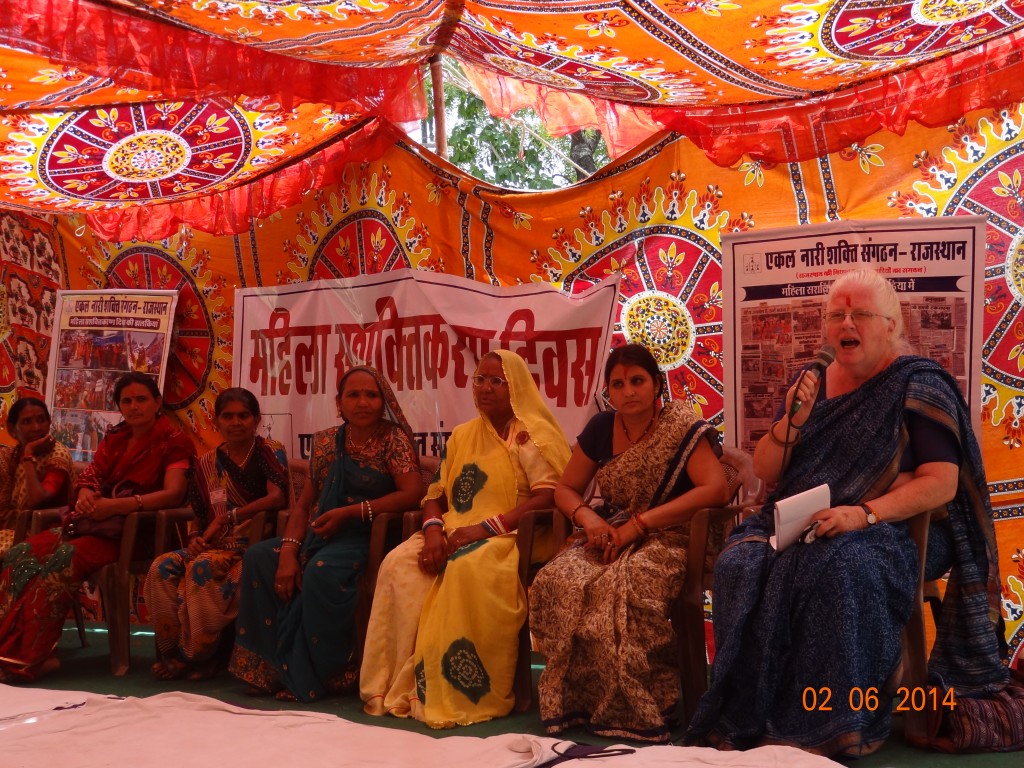India’s single women
“What you think, you become… If you think you are weak, then you are. If you think you are strong, then that’s what you become. Women are not empty vessels that someone will fill our lives with empowerment. We have to draw on our inner strength first, as the power to bring change lies within ourselves.”
Over the years, it is this guiding principle that has helped women like Shabnam, Kanku Bai and Dhuli Bai tide over the really tough times they have faced as single women living in a largely conservative social set up. Every time someone has tried to sideline them or deny them their entitlements they have come together and raised their voice against the injustice instead of blaming their misfortunes on destiny.
This trio is part of an all-powerful single women’s group in Rajasthan. The Ekal Nari Shakti Sangathan (ENSS) needs no introduction today. After all, it is all thanks to their decade-long activism that the rights of widows, deserted and divorced women have become part of the national discourse.
Single women are marginalized
Victimisation of women who do not have any male “protector” or “benefactor,” be it a husband, father, son or brother, is rampant. Patriarchy coupled with archaic caste and community customs ensures that they are not only kept away from the mainstream but are often subject to abuse and violence. Poor and marginalised, these women, especially those residing in remote rural areas, have no real say when it comes to their social, economic, political and legal rights.
In such a scenario, the ENSS becomes their support system. Spread across 137 blocks in the state, the organisation truly has a wide reach. But what does being part of the ENSS really mean to these women?
Kanku Bai, who has spent nine years working in its fold and has now been elected as its chairperson, puts her feelings rather poignantly, I have gained a lot from being in the company of my sisters. Together we have gained an identity as well as the confidence to step out into the world with our head held high.” A former health worker and the head of her village in Ajmer district, Kanku Bai believes that the ENSS’s strength lies in its committed approach towards securing the future of its members.
A small membership fee of 20 Rupees (25 euro-cents) brings about a lifetime of happiness and empowerment for women who have been widowed, separated, abandoned, have walked out of their homes because of physical or mental trauma or are unmarried at 35 years or more. The ENSS works on a variety of problems that impact their lives – from harassment and violence to livelihood, land and property rights issues.
Adopting a proactive approach has worked for this 45,000 member-strong group as not only have they so far managed to secure big gains like the enforcement of 50 percent reservations for the women in village councils, but they have also lobbied for various education and livelihood opportunities for themselves and their children.
Celebrating womanhood
Every year, ENSS members from different parts of the state come together to celebrate womanhood, rejoice in their successes, share their sorrows and set an agenda for the future. They call it Women Empowerment Day.
It is at this annual convention that an updated agenda is discussed after which a petition demanding access to better resources is finalized and signed to be subsequently presented to the state government. This year has been no different. However, instead of holding various meetings at the block level, for the first time a state level consultation was organized in Jaipur where 600 women gathered to show their sense of purpose and commitment to their goals.
Efforts undertaken by the ENSS have ensured that single women now get 1,000 Rupees (around 17 euros) assistance for each child under the Palanhar Yojana. Earlier, it was 675 Rupees (around eight euros) and that too for only one child. In addition, the government grant given to widows at the time of a daughter’s marriage has been doubled – from 5,000 Rupees to 10,000 Rupees (from 70 to 150 euros). Besides this, the state government has provided eight percent reservation in government jobs to widows and two percent to divorced women.
“Persuasion is necessary,” feels Kanku Bai, “because the social security schemes of the state are still a distant reality for many single women. Several do not have their ration cards, while others are struggling to get their pension started.”
Kanku Bai’s organization has also called for a ban on the sale of alcohol in Rajasthan since it is one of the major reasons for violence against women. Dhuli Bai from Aaspur in Dungarpur district feels strongly about alcoholism and is glad that they have put it on their agenda, “Men consume alcohol and beat up their women. It’s one of the most common atrocities we face and it’s high time is it dealt with seriously.”
Chandrakala Sharma, State Coordinator of the ENSS, hopes that the newly-elected government will incorporate them in policy changes. Of course, she knows that it’s a game of perseverance and patience – the two qualities that set women apart from men. Remarks Sharma, “Single women have their own strengths and qualities but most of us are unaware of them. Perhaps this is because of the general belief in society that women are weak. Yes, physically we may not be as strong as men, but once women realise their power, their value, talent and potential, the road to empowerment is not too far.”
Author: Abha Sharma
Editor: Manasi Gopalakrishnan
This is a feature from Womens Features Service.







